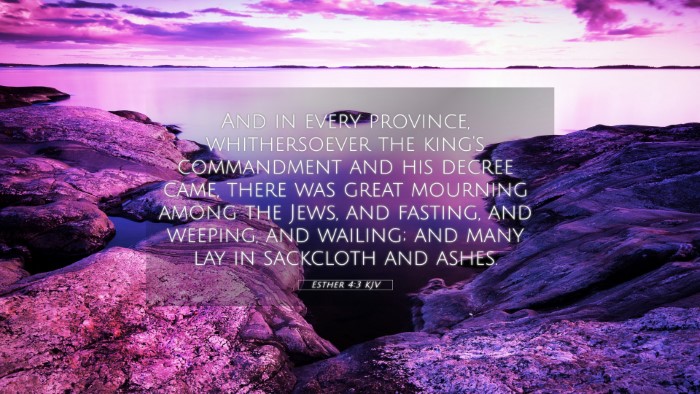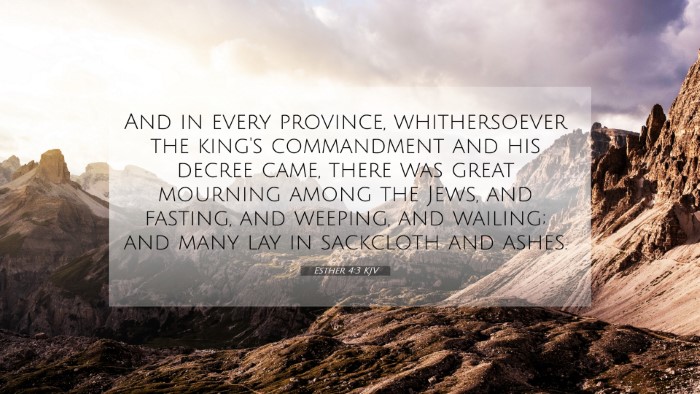Old Testament
Genesis Exodus Leviticus Numbers Deuteronomy Joshua Judges Ruth 1 Samuel 2 Samuel 1 Kings 2 Kings 1 Chronicles 2 Chronicles Ezra Nehemiah Esther Job Psalms Proverbs Ecclesiastes Song of Solomon Isaiah Jeremiah Lamentations Ezekiel Daniel Hosea Joel Amos Obadiah Jonah Micah Nahum Habakkuk Zephaniah Haggai Zechariah MalachiEsther 4:3 Similar Verses
Esther 4:3 Cross References
And in every province, whithersoever the king's commandment and his decree came, there was great mourning among the Jews, and fasting, and weeping, and wailing; and many lay in sackcloth and ashes.
Uncover the Rich Themes and Topics of This Bible Verse
Listed below are the Bible themes associated with Esther 4:3. We invite you to explore each theme to gain deeper insights into the Scriptures.
Esther 4:3 Cross Reference Verses
This section features a detailed cross-reference designed to enrich your understanding of the Scriptures. Below, you will find carefully selected verses that echo the themes and teachings related to Esther 4:3 KJV. Click on any image to explore detailed analyses of related Bible verses and uncover deeper theological insights.
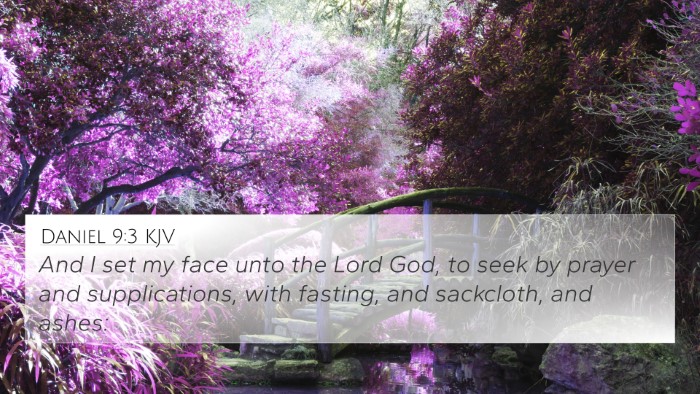
Daniel 9:3 (KJV) »
And I set my face unto the Lord God, to seek by prayer and supplications, with fasting, and sackcloth, and ashes:

Isaiah 22:4 (KJV) »
Therefore said I, Look away from me; I will weep bitterly, labour not to comfort me, because of the spoiling of the daughter of my people.
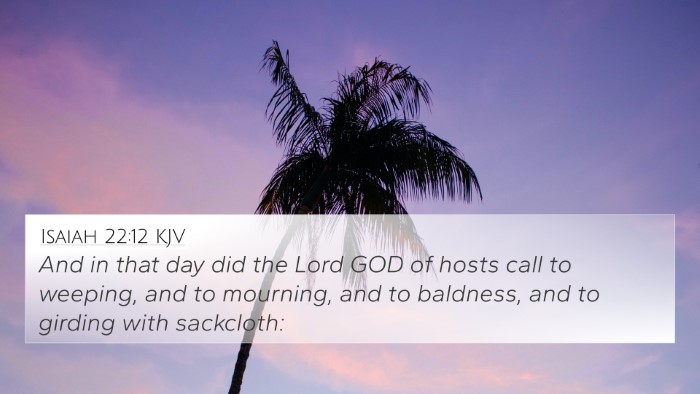
Isaiah 22:12 (KJV) »
And in that day did the Lord GOD of hosts call to weeping, and to mourning, and to baldness, and to girding with sackcloth:
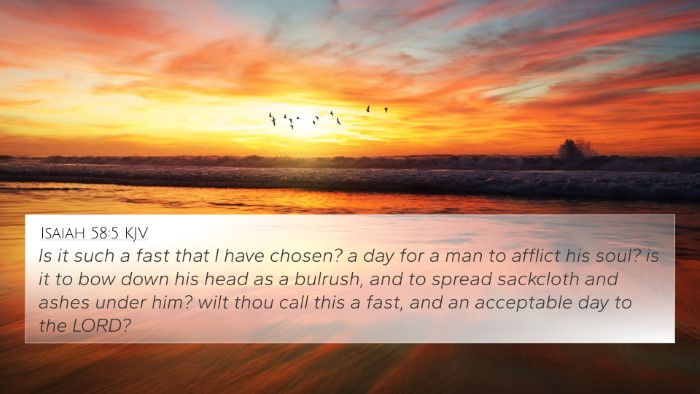
Isaiah 58:5 (KJV) »
Is it such a fast that I have chosen? a day for a man to afflict his soul? is it to bow down his head as a bulrush, and to spread sackcloth and ashes under him? wilt thou call this a fast, and an acceptable day to the LORD?
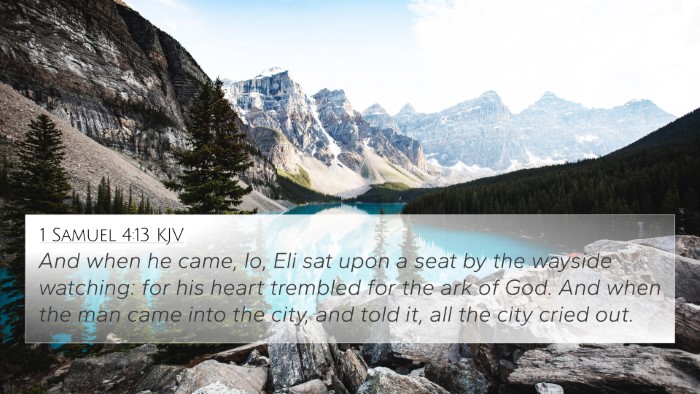
1 Samuel 4:13 (KJV) »
And when he came, lo, Eli sat upon a seat by the wayside watching: for his heart trembled for the ark of God. And when the man came into the city, and told it, all the city cried out.
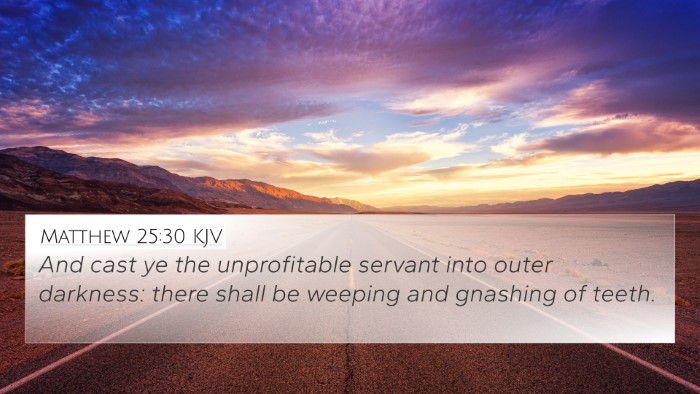
Matthew 25:30 (KJV) »
And cast ye the unprofitable servant into outer darkness: there shall be weeping and gnashing of teeth.

Matthew 13:42 (KJV) »
And shall cast them into a furnace of fire: there shall be wailing and gnashing of teeth.

Isaiah 37:1 (KJV) »
And it came to pass, when king Hezekiah heard it, that he rent his clothes, and covered himself with sackcloth, and went into the house of the LORD.
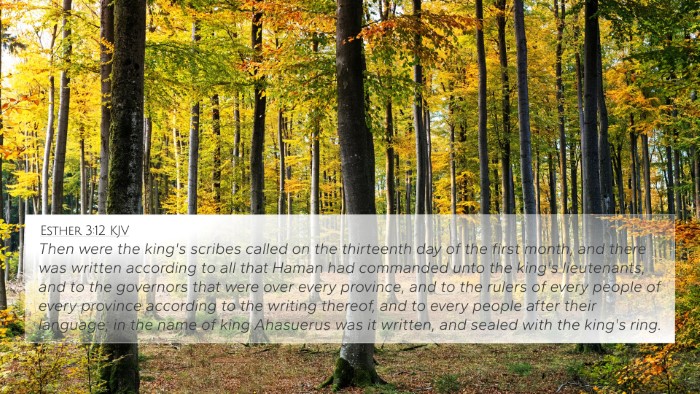
Esther 3:12 (KJV) »
Then were the king's scribes called on the thirteenth day of the first month, and there was written according to all that Haman had commanded unto the king's lieutenants, and to the governors that were over every province, and to the rulers of every people of every province according to the writing thereof, and to every people after their language; in the name of king Ahasuerus was it written, and sealed with the king's ring.
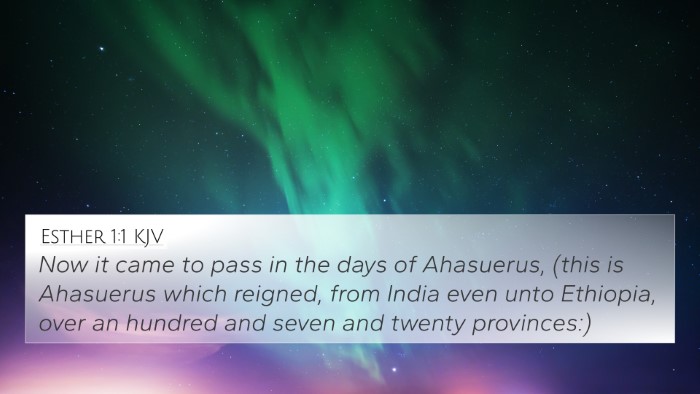
Esther 1:1 (KJV) »
Now it came to pass in the days of Ahasuerus, (this is Ahasuerus which reigned, from India even unto Ethiopia, over an hundred and seven and twenty provinces:)
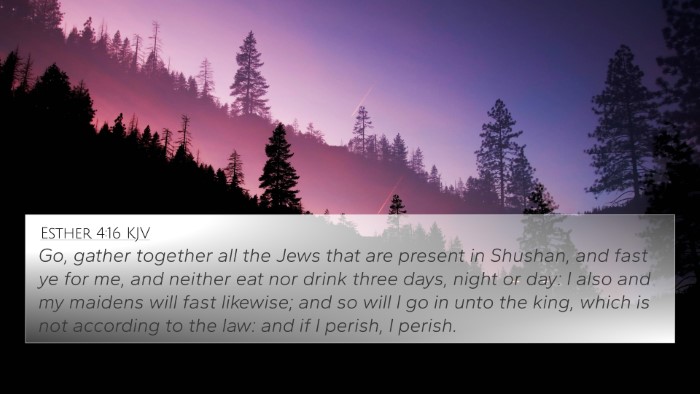
Esther 4:16 (KJV) »
Go, gather together all the Jews that are present in Shushan, and fast ye for me, and neither eat nor drink three days, night or day: I also and my maidens will fast likewise; and so will I go in unto the king, which is not according to the law: and if I perish, I perish.
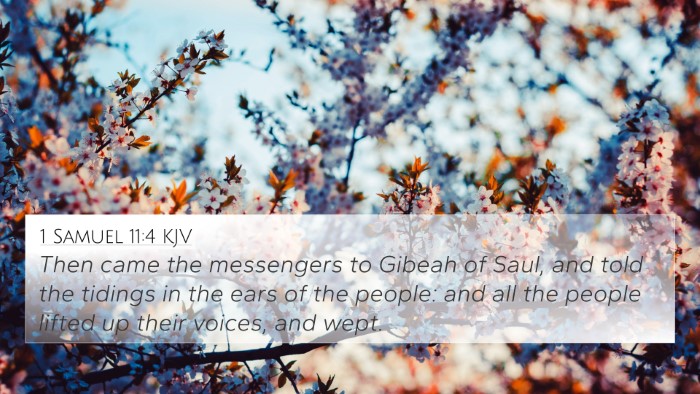
1 Samuel 11:4 (KJV) »
Then came the messengers to Gibeah of Saul, and told the tidings in the ears of the people: and all the people lifted up their voices, and wept.

Matthew 22:13 (KJV) »
Then said the king to the servants, Bind him hand and foot, and take him away, and cast him into outer darkness, there shall be weeping and gnashing of teeth.
Esther 4:3 Verse Analysis and Similar Verses
Understanding Esther 4:3
Esther 4:3 presents a powerful moment in the Biblical narrative where the Jewish people are filled with great sorrow in the face of impending doom. This verse reads:
"And in every province, whithersoever the king's commandment and his decree came, there was great mourning among the Jews, and fasting, and weeping, and wailing; and many lay in sackcloth and ashes."
Contextual Background
This verse is situated within the broader story of Esther, a narrative that unfolds during the Persian Empire. It is a story about identity, courage, and the hidden workings of divine Providence. The decree from King Xerxes, instigated by Haman, threatened the annihilation of the Jewish people, prompting widespread grief.
Thematic Analysis
- The Weight of Mourning: The mourning described in this verse signifies deep sorrow and despair among the Jews. It illustrates how dire circumstances can impact entire communities, urging believers to empathize with communal suffering.
- Fasting and Prayer: The act of fasting mentioned emphasizes the spiritual response to crisis, which is a common theme throughout Scripture that connects with other Biblical instances of seeking God through prayer and fasting (e.g., Joel 2:12-13, Matthew 17:21).
- Significance of Sackcloth and Ashes: This traditional expression of mourning signifies repentance and a plea for divine intervention, echoing practices seen in Job 2:8 and in the responses of others in Scripture when seeking God's mercy.
Biblical Cross-References
Esther 4:3 can be cross-referenced with several other Biblical passages that enrich its meaning:
- Joel 2:12-13: Calls for genuine repentance and turning back to God.
- Daniel 9:3: Daniel prays and fasts earnestly for his people.
- Nehemiah 1:4: Nehemiah mourns for Jerusalem when he hears of its strife.
- Matthew 5:4: Jesus speaks about those who mourn being comforted.
- Psalm 30:5: Assurance that joy comes in the morning after sorrow.
- 1 Peter 5:7: Encouragement to cast all anxieties upon God.
- Isaiah 61:3: God’s promise to comfort those who mourn.
Comparative Analysis with Other Scriptures
The emotional response in Esther 4:3 reveals deep connections between various Scriptures dealing with grief and divine solace. For instance:
- Connections between Old and New Testament: The anguish of the Jews parallels the sentiments conveyed in Matthew 26:38, where Jesus expresses sorrow unto death.
- Inter-Biblical Dialogue: The theme of suffering and divine rescue is central to both Esther and the Gospels, where Jesus ultimately offers salvation, showcasing God's enduring commitment to His people through crises.
Insights from Public Domain Commentaries
Commentators have provided rich insights into this poignant scripture:
- Matthew Henry: He emphasizes the emotional and spiritual turmoil of the Jews, highlighting how communal crises can draw individuals closer to God through collective prayer and fasting.
- Albert Barnes: He reflects on the power of fasting as a means of seeking God's favor during times of dire situation, indicating that such acts were not just outward expressions but heartfelt pleas to God.
- Adam Clarke: Suggests that the public display of mourning indicated a profound awareness of their identity and the threat to their existence. Clarke notes that their actions were pivotal as they sought divine intervention.
Conclusion
Esther 4:3 resonates deeply within the fabric of Biblical literature, encapsulating essential themes of community, faith, and divine assistance in times of sorrow. It reminds believers of the importance of turning to God through fasting, prayer, and repentance in the face of adversity. By cross-referencing this verse with others, one can better understand its place within the overarching Biblical narrative, making use of tools for Bible cross-referencing, Bible concordance, and Bible reference resources to deepen their study.
Further Study Resources
For those interested in exploring the connections between Bible verses, consider utilizing:
- Bible Concordance: An invaluable tool to assist in finding cross-references and related verses.
- Bible Cross-reference Guide: Useful for finding thematic connections within scripture.
- Cross-reference Bible Study: Engaging in methods that promote the interrelatedness of verses to enhance understanding.
In summary, Esther 4:3 serves as a vital reminder of the power of faith through trials and the need for communal prayer and repentance, resonant across the scriptures and foundational for biblical studies.

